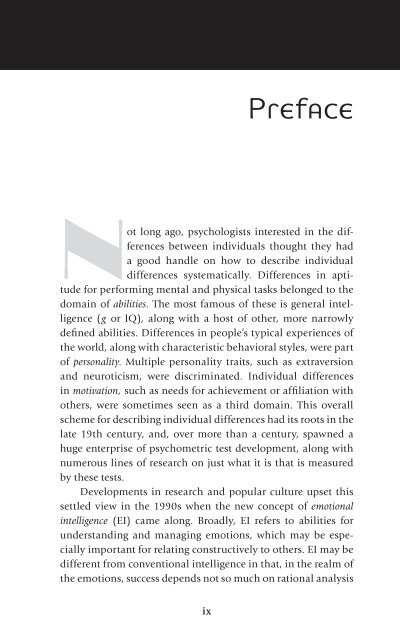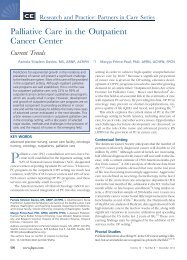Untitled - Springer Publishing
Untitled - Springer Publishing
Untitled - Springer Publishing
Create successful ePaper yourself
Turn your PDF publications into a flip-book with our unique Google optimized e-Paper software.
PREFACE<br />
Preface<br />
Not long ago, psychologists interested in the differences<br />
between individuals thought they had<br />
a good handle on how to describe individual<br />
differences systematically. Differences in aptitude<br />
for performing mental and physical tasks belonged to the<br />
domain of abilities. The most famous of these is general intelligence<br />
(g or IQ), along with a host of other, more narrowly<br />
defined abilities. Differences in people’s typical experiences of<br />
the world, along with characteristic behavioral styles, were part<br />
of personality. Multiple personality traits, such as extraversion<br />
and neuroticism, were discriminated. Individual differences<br />
in motivation, such as needs for achievement or affiliation with<br />
others, were sometimes seen as a third domain. This overall<br />
scheme for describing individual differences had its roots in the<br />
late 19th century, and, over more than a century, spawned a<br />
huge enterprise of psychometric test development, along with<br />
numerous lines of research on just what it is that is measured<br />
by these tests.<br />
Developments in research and popular culture upset this<br />
settled view in the 1990s when the new concept of emotional<br />
intelligence (EI) came along. Broadly, EI refers to abilities for<br />
understanding and managing emotions, which may be especially<br />
important for relating constructively to others. EI may be<br />
different from conventional intelligence in that, in the realm of<br />
the emotions, success depends not so much on rational analysis<br />
ix<br />
Matthews_PTR_FM_12-10-11_i-xviii.indd ix<br />
10/12/2011 8:48:05 PM
















